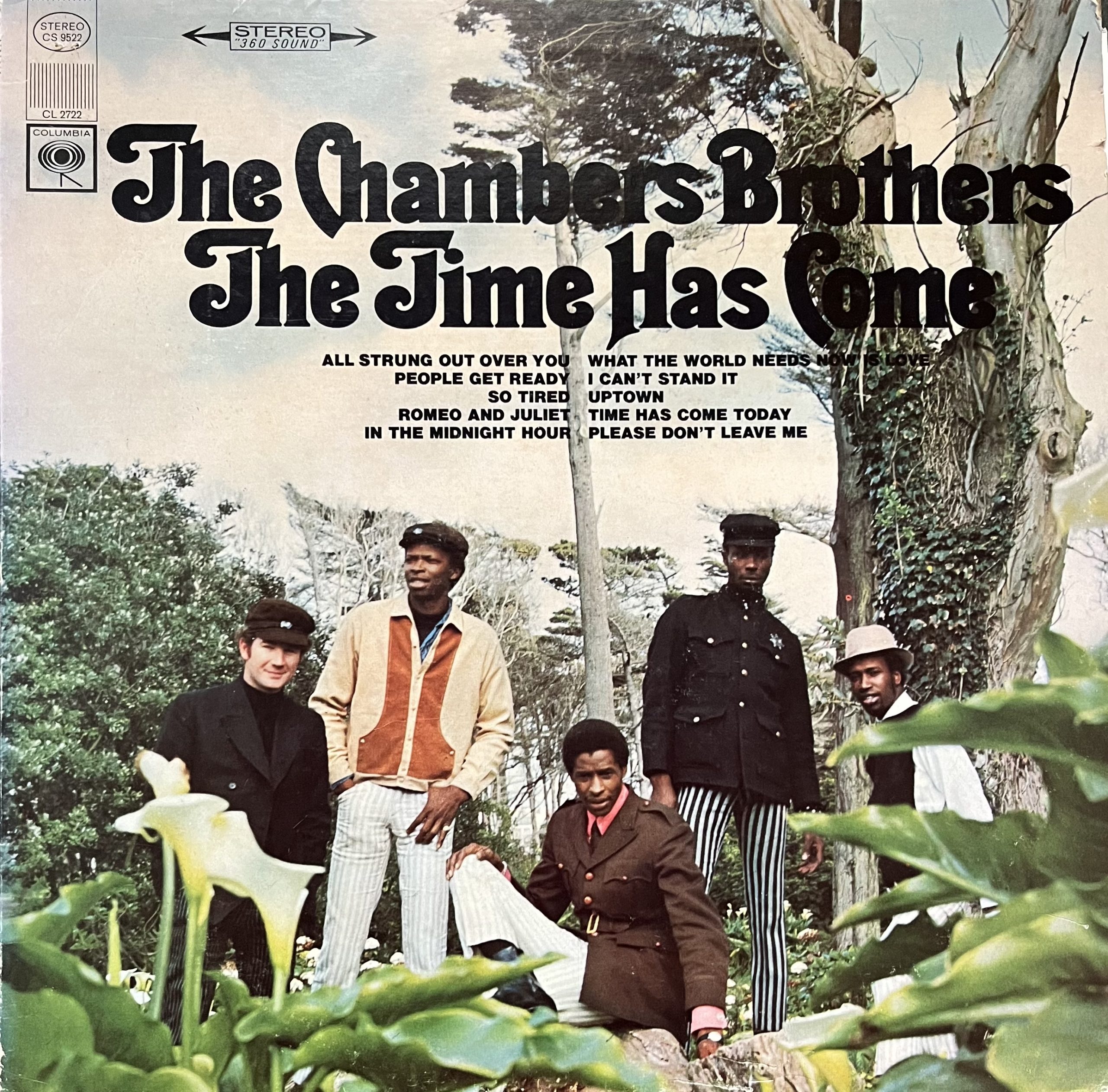 “And my soul has been psychedelicized!”
“And my soul has been psychedelicized!”
If you’ve listened to Time Has Come Today, the 1967 hit by the Chambers Brothers, you have likely been psychedelicized. And possibly politicized too.
You’ve probably heard at least parts of the iconic song in films and documentaries covering the music, culture, and civil rights struggles of the late 1960s. But if you haven’t listened to the full 11 minute LP version, I can’t recommend it enough. I remember the first time a friend played the track for me in a small, falling apart rental house in Boone when I was in school at Appalachian. It was unlike anything I’d heard before – the constant ticking of the cowbell mimicking a clock (rivaling any better known songs featuring cowbell, ahem), the alternate speeding up and slowing down of the tempo, the steady bass/drum rhythm melding into an extended break of a hypnotic fuzz guitar solo punctuated by a repeated chorus of voices chanting “TIME!”, bouts of foreboding laughter, and wails of “Ahhhhhhhhhhh!” Yeah, this song is a whole mood, as they say.
The Chambers Brothers were four brothers from a sharecropping family in Mississippi – George, Lester, Willie, and Joe– who sang in the fields together before forming as a gospel group at the Mount Calvary Baptist Church in 1954. They later joined up with English drummer Brian Keenan, making up one of the first interracial rock bands in the U.S. They’re often described as a psychedelic soul band that mixed gospel, blues, rock, funk, and R&B.
Time Has Come Today was written by Joe, the youngest of the four, after he sat in on a class with “hero of American consciousness” Timothy Leary; brother Willie later added the music and the psychedelicized line. The song was first released in 1966 as a single version coming in at just over two minutes but didn’t make a splash until it was re-recorded in 1967. Legend goes that producer David Rubinson rebelled against Columbia Records president Clive Davis’ explicit directive NOT to re-record the song and asked the band to come into the studio an hour early where they got the song down in just one take, resulting in the extended version that went to #11 on the Billboard Hot 100 for 5 weeks. Not only did the song serve as an introduction to psychedelic rock, it seemed to simultaneously comment on the upheaval and social unrest of the time and also foreshadow what was still to come. Without being too overtly political, it leaves a lot to the listeners’ interpretation: what has the time come for? Reflecting on the lyrics this Juneteenth, I like to consider what kind of expansive emancipation the brothers might have been calling for:
Time has come today
Young hearts can go their way
Can’t put it off another day
I don’t care what others say
They say we don’t listen anyway
Time has come today…
 While we’re talking Chambers Brothers, make sure to check out two of their other notable albums. Love Peace and Happiness is a double LP combining studio material with a live show from Fillmore East. Released in 1970, the album features the truly excellent 16 minute side-filling song of the same name, also written by the brothers and produced by David Rubinson. Like Time, this song includes the brothers’ signature elements of psychedelic guitar, layered crescendo of voices, rhythmic cowbell clanging, and a plea for togetherness. Flip to the other side and take in their simultaneously rocking and plaintive version of Wade in the Water, as well as their soulful rendering of Curtis Mayfield’s iconic People Get Ready.
While we’re talking Chambers Brothers, make sure to check out two of their other notable albums. Love Peace and Happiness is a double LP combining studio material with a live show from Fillmore East. Released in 1970, the album features the truly excellent 16 minute side-filling song of the same name, also written by the brothers and produced by David Rubinson. Like Time, this song includes the brothers’ signature elements of psychedelic guitar, layered crescendo of voices, rhythmic cowbell clanging, and a plea for togetherness. Flip to the other side and take in their simultaneously rocking and plaintive version of Wade in the Water, as well as their soulful rendering of Curtis Mayfield’s iconic People Get Ready.
Finally, don’t sleep on the 1966 LP Barbara Dane and the Chambers Brothers for a politically charged collaboration with the singer and activist that mixes folk, gospel, and pop with bare instrumentation, harmonica, and hand clapping. The album opens strong with the brothers doo wop harmonizing along with Dane’s full-throated voice in It Isn’t Nice, a powerful anthem on civil disobedience written by Malvina Reyolds after she participated in the San Francisco Palace Hotel Sit-Ins:
It isn’t nice to block the doorway
It isn’t nice to go to jail
There are nicer ways to do it
But the nice ways always fail
It isn’t nice, it isn’t nice
You told us once, you told us twice
But if that is freedom’s price
We don’t mind
We received this disc thanks to the Smithsonian Folkways Recordings nonprofit record label which makes custom copies from their collection along with original liner notes. All of these titles are available to check out from the Music Library in the Mary Duke Biddle Music Building so what are you waiting for? The time has come today!


